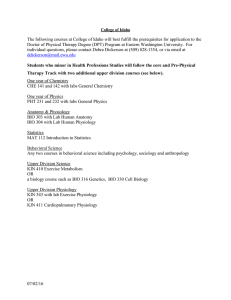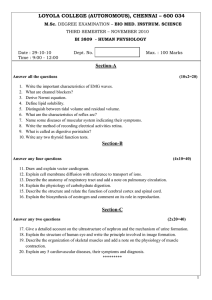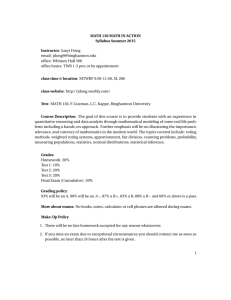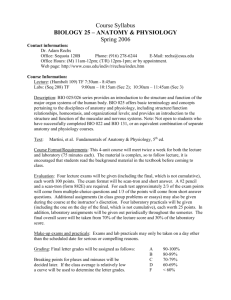BIO 319 Spring 2008 Syllabus “General Animal Physiology”
advertisement
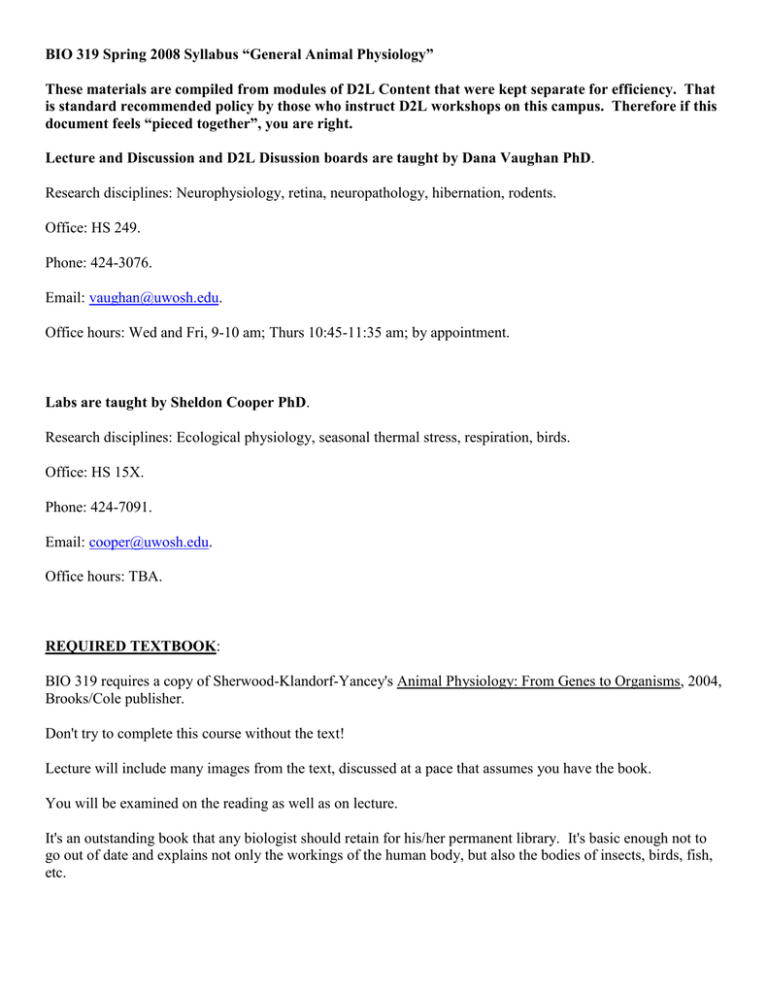
BIO 319 Spring 2008 Syllabus “General Animal Physiology” These materials are compiled from modules of D2L Content that were kept separate for efficiency. That is standard recommended policy by those who instruct D2L workshops on this campus. Therefore if this document feels “pieced together”, you are right. Lecture and Discussion and D2L Disussion boards are taught by Dana Vaughan PhD. Research disciplines: Neurophysiology, retina, neuropathology, hibernation, rodents. Office: HS 249. Phone: 424-3076. Email: vaughan@uwosh.edu. Office hours: Wed and Fri, 9-10 am; Thurs 10:45-11:35 am; by appointment. Labs are taught by Sheldon Cooper PhD. Research disciplines: Ecological physiology, seasonal thermal stress, respiration, birds. Office: HS 15X. Phone: 424-7091. Email: cooper@uwosh.edu. Office hours: TBA. REQUIRED TEXTBOOK: BIO 319 requires a copy of Sherwood-Klandorf-Yancey's Animal Physiology: From Genes to Organisms, 2004, Brooks/Cole publisher. Don't try to complete this course without the text! Lecture will include many images from the text, discussed at a pace that assumes you have the book. You will be examined on the reading as well as on lecture. It's an outstanding book that any biologist should retain for his/her permanent library. It's basic enough not to go out of date and explains not only the workings of the human body, but also the bodies of insects, birds, fish, etc. PERSONS WITH DISABILITIES Persons with disabilities are welcome in this course. Please contact your lecture and lab instructors on the first day of class to ensure that we can do our best to accommodate you in a timely fashion. If you require accommodation on exams (e.g. Project Success), notify us of this during the first week of class and don't forget your documentation. ABOUT ATTENDANCE I won't take roll after the first day or so, but it's safe to say that missing class will hurt your p erformance. Attendance is important because Phys is a hard subject and I structure class to make every meeting count. Some topics aren't in the book, so you get it from class attendance or not at all. Look at the D2L module regarding the schedule to ensure you arrange your schedule NOW to make it to all exams. I never, ever give exams early, so don't bother asking. If you miss Exam 1, 2, or 3, I have a make-up mechanism. You'll get an email from me to the effect that I have no exam score from you. After that, it's your decision to either (a) take a zero for that exam, or (b) show up to what would have been our last lecture meeting (Fri May 16) and take a comprehensive make-up exam. If you miss Exam 4, you need to provide me with documentation from the Dean of Students Office regarding the reason for your miss, and then I'll record an Incomplete grade. There is also a form that we need to fill out together to complete this process. You can make up your Incomplete work next Fall 2008 when BIO 319 is offered again (by Dr. Cooper), by taking his final exam. If you don't complete the Fall 2008 final exam, the Incomplete becomes an F; that's a University regulation. ABOUT GRADING: Exam question format will vary. Expect a little bit of everything, including multiple choice Choose All That Apply. My exams are written so that no one "aces" them; I want to "stretch" the class. However the average is usually a healthy 75% C. I reserve the right to curve to obtain a C average. Your BIO 319 grade is earned from 5 assignments: Exam 1: 10% Exam 2: 10% Exam 3: 20% Exam 4: 30% Lab: 30% Note that the percent weight of later exams increases. This builds in the benefit of the doubt for the slow starter in Phys who "starts to get it" later in the term. It also reflects the fact that Phys is cumulative and more knowledge needs to be recalled properly to handle the later material. ABOUT GRADING DISPUTES: I make math errors every semester. I'm human. If you identify a math error, contact me ASAP. Since we meet 4 days a week, that won't be hard. If you disagree with how an exam item was graded, your first obligation is to closely examine the key I will post to be sure you understand what I thought went wrong. If you still disagree with me, contact me politely and be prepared to clearly explain your position. I'll listen. ABOUT ACADEMIC MISCONDUCT: Academic Misconduct is outlined in your student handbook; know those policies. All exams are NO book, NO notes, NO neighbor. Any (first) attempt to use any of these three during an exam will result in a zero for that exam and NO make-up opportunity. Any (second) attempt will result in an F for the course and referral to the Dean of Students for formal discipline. Any willful mistreatment or negligence toward any animal used in lab, or any willful negligence that results in bodily harm or destruction of equipment, will carry the penalty of an F for the course and referral to the Dean of Students for formal discipline. ABOUT LECTURE: It is recommended that you bring your Sherwood text to lecture if possible. During lecture, I will display Powerpoint images from the book and write on the overhead projector. However, I won't be distributing my Powerpoints or photocopies of my overheads. Instead, I expect people to take notes the old-fashioned way. Why? Moving your hand engages your brain in active learning circuitry that is simply physiologically more advantageous for efficient learning. If I go through an idea too fast, say something! I don't want to be a talking head. ABOUT LAB: Dr. Cooper is in charge of lab. He'll report your summary lab grade to Dr. Vaughan at the end of the term, who will enter it onto D2L and use it to compute your final course grade. If you have a dispute about your lab grade, you must see Dr. Cooper about it. BIO 319 lab has high expectations. Here are a few things that matter: 1. Responsible use of research animals. We do use a very small number of animals in lab. All use was preapproved down to the last detail, and approved procedures must be followed. Respectful, humane, sincere effort is required of all students during procedures involving animals. Anything less may constitute academic misconduct. 2. Responsible cooperation with lab partners. Just as in a real-life lab occupation, you will work in groups. This can be a good or bad experience but you do not have to be a "victim" (or beneficiary) of the luck of the draw. Engage your lab partners in forming a functional group. Share roles between experiments so that everyone has a chance to be Team Leader. Contact Dr. Cooper if serious conflicts arise. 3. Arriving to lab well-prepared for the day's work. Fortune favors the prepared mind, and students who know what they're doing also get done in lab on time. BIO 319 labs are involved enough that you need to hit the ground running each day, so spend some time every Monday getting ready for Tuesday lab. 4. Authentic experience with professional-grade instrumentation. One of the selling points of any biologist's resume is her/her experience with instrumentation. BIO 319 lab has benefitted from University investments so this isn't a rinky-dink lab. You'll have the chance to learn to do real lab procedures. Or, if your lab partners allow it (and we hope they don't), you can just sit and watch. 5. Conscientious, complete recording of work done in a lab notebook. Careers in the real world of science have been killed (i.e. entire educations wasted) when lab notebooks were challenged and found to be fragmentary or plagiarized or fabricated. Your notebook is a moment-to-moment, living diary of what you did and what happened, and what you'll do next. It's proof you did what you say you did. Each person has his/her own lab notebook; there is never a group book. Dr. Cooper will have more to say on this issue. ABOUT DISCUSSION SECTION Discussion section is not optional. In it: We'll help one another "digest" the assigned reading through a process known as "recitation". I'll pose questions to be answered through the reading, I'll randomly call on a person to answer the question assuming s/he has done the reading. Answer = smiley face. No answer = frowney face. We'll rehearse concepts learned earlier (an activity that, of course, can only help you earn better exam grades). We'll relate later concepts to earlier ones (an activity that, of course, can only help you earn better exam grades). We'll relate the classroom to the real world (case studies, news articles, questions from the class). We'll conduct three of our four Exams, including the final (which means NO CLASS on Fri May 16). HOW HARD IS THIS CLASS? Physiology is intrinsically challenging for a number of reasons. Phys is interdisciplinary, incorporating physics, chemistry, anatomy, cell biology, even ecology. You have to remember stuff from BIO 105 and 323 in order to do well. Phys is cumulative, so you have to remember everything we learned in the first week, right up through the last week. You have to think on levels zinging from molecular to ecological and back again. You have to gain accurate mental images of phenomena no one can show you directly with a camera or microscope. Memorization isn't enough; you have to understand well enough to predict. So this is a pretty hard class. It also may be one of the most personally useful classes you'll take, since it teaches you how your own body works (and fails to work, when injured or diseased). Let's face it; everyone wants to earn an A in every class. History shows that it's not too tough to earn a C in my BIO 319, but it DOES take a lot of effort to earn an A. Note that I cannot grade on effort but rather must rely on achievement. HOW TO DO YOUR BEST IN THIS CLASS: The beginning physiology student is a lot like a beginning taxi driver, whose goal is to be able to navigate with confidence through an entire city, even to the extent of making a savvy educated guess when a slightly obscure address comes up. (Work with me here.) The animal body is like a large city, with separate, yet interdependent, neighborhoods all connected by roads. You may learn one neighborhood at a time, as a convenience measure of your training program, but your real goal is to know the entire city by the end of the semester. The animal body is not static, either. To stay alive, it must constantly adjust its function to current conditions. It ages and responds to infection. Thus, physiological functions change moment to moment, day to day, month to month, year to year. To continue the metaphor, the city undergoes construction. Some neighborhoods are bulldozed, others are built from scratch, still others are simply refurbished. Some times of the year, street sweepers are best; while other times require snow plows. If you've had an Anatomy class (and we don't assume that you have, for 319), you likely used a strategy of memorization quite successfully. However, Physiology is a more of a “moving target” than Anatomy is. Mastery of Physiology cannot be obtained simply by memorization. You also need to “see” physiological functions in action in your mind’s eye, and to understand their changing nature. This takes practice and is a real adjustment for some students. It’s in your interest AND mine for everyone to succeed, so here is important advice: · Re-read the previous lecture’s notes for each lecture you attend. Your Instructor will “pick up where s/he left off”, and you should, too. · Keep up, don't catch up. Experience with hundreds of students in this course shows that it is impossible to catch up if you fall behind. Make at least 5 study hours outside of class per week available for this course; MORE when there is a scheduled exam. Do not wait for the week of the exam to study. Cramming only boosts anxiety, and anxiety lowers performance. Get plenty of sleep. · Ask questions promptly; don’t hope that you’ll “get it later”. Attend office hours and/or post your question on the D2L Discussion board. Don’t wait till the night before the test! · Start a study group, or join one. Group study affords you the chance to rehearse your physiology vocabulary and to use all your senses to “attack” concepts. It is also a great motivator to spend blocks of time on the course. Studies suggest that you remember 10% of what you read, 20% of what you hear, but 70% of what you say out loud! · Rewrite your notes as "study posters". Lecture notes are delivered in chronological fashion: Monday, Wednesday, and Friday. What you need to achieve is a holistic understanding of each topic, regardless of when you learned about it. Therefore, your best strategy is to re-write your notes in blocks based on concepts. I suggest that you tape pieces of paper together to make a large “study poster” sheet. Leave plenty of space because we tend to come back to the same core topics throughout the semester. Some suggested topics for study posters are: CO2 + H2O chemistry Metabolic biochemistry Joe Cell gradients & membrane transport Ca++ management Excitability Epithelial transport Blood and pH management (good reason to combine these into one, as you'll see) Circulation & Respiration (good reason to combine these into one, as you'll see) Skeletal muscle (others will suggest themselves as you get the hang of it) Vaughan’s BIO 319 Spring 2008 CLASS SCHEDULE We may go faster or slower in lecture than shown. Discussion sections are REQUIRED. If we get behind, new material will be presented there. Otherwise it will be used to teach intellectual skill sets aside from content that are intrinsic to the study of physiology. Note: Dr. Cooper is teaching lab and has full supervision of that schedule. Contact him for lab schedule! Regarding chapter assignments in the Sherwood text: If a chapter is shown in red boldface, you are encouraged to read the entire chapter in preparation for lecture. If a chapter is shown in regular font, only part of the chapter will be covered that week, and you are encouraged to make note of the lecture topics and then use the INDEX to discover the pages within each listed chapter that should be read. I WILL BE MAKING SPECIFIC READING ASSIGNMENTS ANNOUNCED DURING CLASS, IN ADDITION TO WHAT IS SHOWN HERE. Week Start Date Reading Mon-Wed-Fri Lecture Thur Discussion Feb 4 1, 2, 3, 15 Feb 11 3, 4, 9, 13 Feb 18 9, 11, 13 Feb 25 Mar 3 Mar 10 8 9 9, 10, 11 Mar 17 14 Mar 24 Mar 31 7 Lecture, Lab, & Discussion ALL meet the first week of classes! Foundations, Cellular metabolism, Energy TBA, likely review and practice exam questions balance, Thermal physiology Transport epithelia, Capillary exchange, TBA, likely review and practice exam questions Excitable cells, Composition of body fluids TBA, likely review and practice exam questions Integument Gas Transport & Systems Integration Muscle Physiology Thu Feb 28: Exam 1 (Feb 4-25) Cardiovascular Physiology TBA, likely review and practice exam questions Lymphatics & Immunology TBA, likely review and practice exam questions Respiratory Physiology Digestive Physiology TBA, likely review and practice exam questions Fri Mar 21: Exam 2 (Feb 4-Mar 19) NO CLASS SPRING BREAK Endocrinology TBA, likely review and practice exam questions Apr 7 Apr 14 4, 5 4, 5 Neurophysiology Neurophysiology TBA, likely review and practice exam questions TBA, likely review and practice exam questions Apr 21 6 Sensory Physiology TBA, likely review and practice exam questions Apr 28 12, 13 May 5 May 12 16 Apr 28 – May 1: DKV likely gone to meeting, may have guest lecturer on Wed. Mon Apr 28: Exam 3 (Feb 4 – Apr 23) TBA, likely review and practice exam questions Osmoregulation Reproductive Physiology TBA, likely review and practice exam questions Mon: Catch-up as needed Thu May 15: Exam 4 (Feb 4 – May 12) Wed: Review Q&A Fri May 16: Make Up exam Grades due to TitanWeb on May 21 by 6 pm
